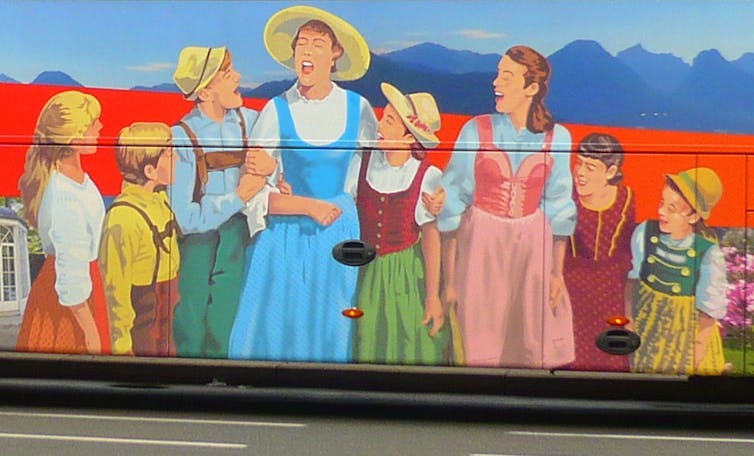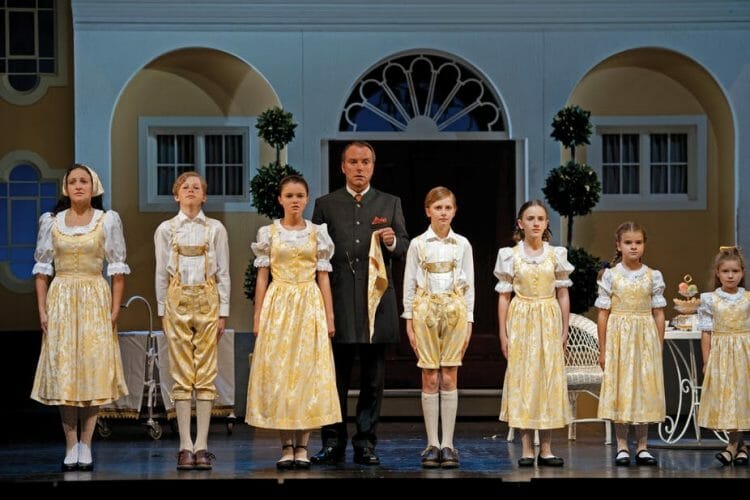How Austrians learned to stop worrying and love The Sound of Music
The palace is just one of a number of tourist sites in the area – fans also go to visit the Mirabell Gardens, where the seven von Trapp children sing Do Re Mi in the film, and Nonnberg Abbey, where the actual Maria Kutschera married Baron von Trapp in 1927.
So Austrian history and American musicals meld in Salzburg. This is no better illustrated than by an Austrian Christmas egg ornament featuring a hand-painted Julie Andrews in all her Maria splendour, ready to twirl through an alpine meadow.
Die Trapp Familie
The real-life aspiring nun/teacher Maria was an enterprising woman. Following her marriage to the former naval captain von Trapp (and the birth of three more von Trapps), she worked hard to create a public image for the Trapp Family Singers. The family, struggling financially, had begun touring through Europe as a singing group in 1935. They eventually emigrated to the United States and settled in Vermont.
Maria went on to publish five books chronicling her life and the family’s music tours. She sold the rights to her autobiography, which first inspired a West German film, Die Trapp Familie, and its sequel, Die Trapp Familie in Amerika. The Broadway team of songwriters Richard Rodgers and Oscar Hammerstein II, with librettists Howard Lindsay and Russel Crouse, then adapted Maria’s memoirs as a vehicle for Broadway’s sweetheart Mary Martin, who starred as Maria opposite Austrian-American folk singer Theodore Bikel as Georg von Trapp.

Critics in 1959 found the musical to be a somewhat old-fashioned operetta, but it was the Broadway production that introduced the now-beloved songs such as My Favourite Things, So Long Farewell, and Climb Ev’ry Mountain. It enjoyed a run of 1443 performances.
As the Broadway run ended, the film adaptation was well under way. On the basis of her work in the as yet unreleased Mary Poppins, Julie Andrews was cast as Maria, opposite Christopher Plummer as Captain von Trapp. Though the cast and crew spent a relatively short period of time filming in Salzburg, their work ensured that the town would forever after be filled with the sound of tourists – especially from Asia and the US – though to very mixed reactions from locals.
Dismissed in Austria
Residents of Salzburg were far less familiar with the musical. It was widely dismissed as kitschy. Carl Philip von Maldeghem, the current artistic director of the Salzburg State Theatre, spent a year abroad in the United States in the 1980s and was surprised to see The Sound of Music on television there. He recently made it his mission to finally stage the musical in Salzburg.
As an American projection of Austrian history, the idea of a stage production in Salzburg was not popular with local politicians and the theatre’s subscribers. But von Maldeghem persevered. Hundreds of local children in dirndls and lederhosen turned up to audition for the roles of the von Trapp children. “They are a new generation of Austrians who felt it was part of their history,” von Maldeghem explained.

Casting these Austrian children was a major step in bringing the musical home to Salzburg. And Von Maldeghem had stressed the importance of carefully engaging with the local setting immediately outside the theatre:
‘Here the audience comes from skiing, from the lakes, with beauty in their mind. Depicting the same thing on stage would have been boring, and would have confirmed the American projection’
To avoid replicating Salzburg, set designer Court Watson created the Salzburg skyline but only in silhouette, framed by the forest.
The show was expected to last for a very limited run. But the Salzburg production has instead been regularly performed in German since its 2011 opening, with English surtitles provided for foreign spectators. Given the worldwide popularity of sing-a-long Sound of Music cinema screenings, the Salzburg production has even added a sing-a-long at the end of the stage musical. The musical had a mountain to climb in winning over locals, but the hills surrounding Salzburg now remain filled with the sound of this universally loved musical.


